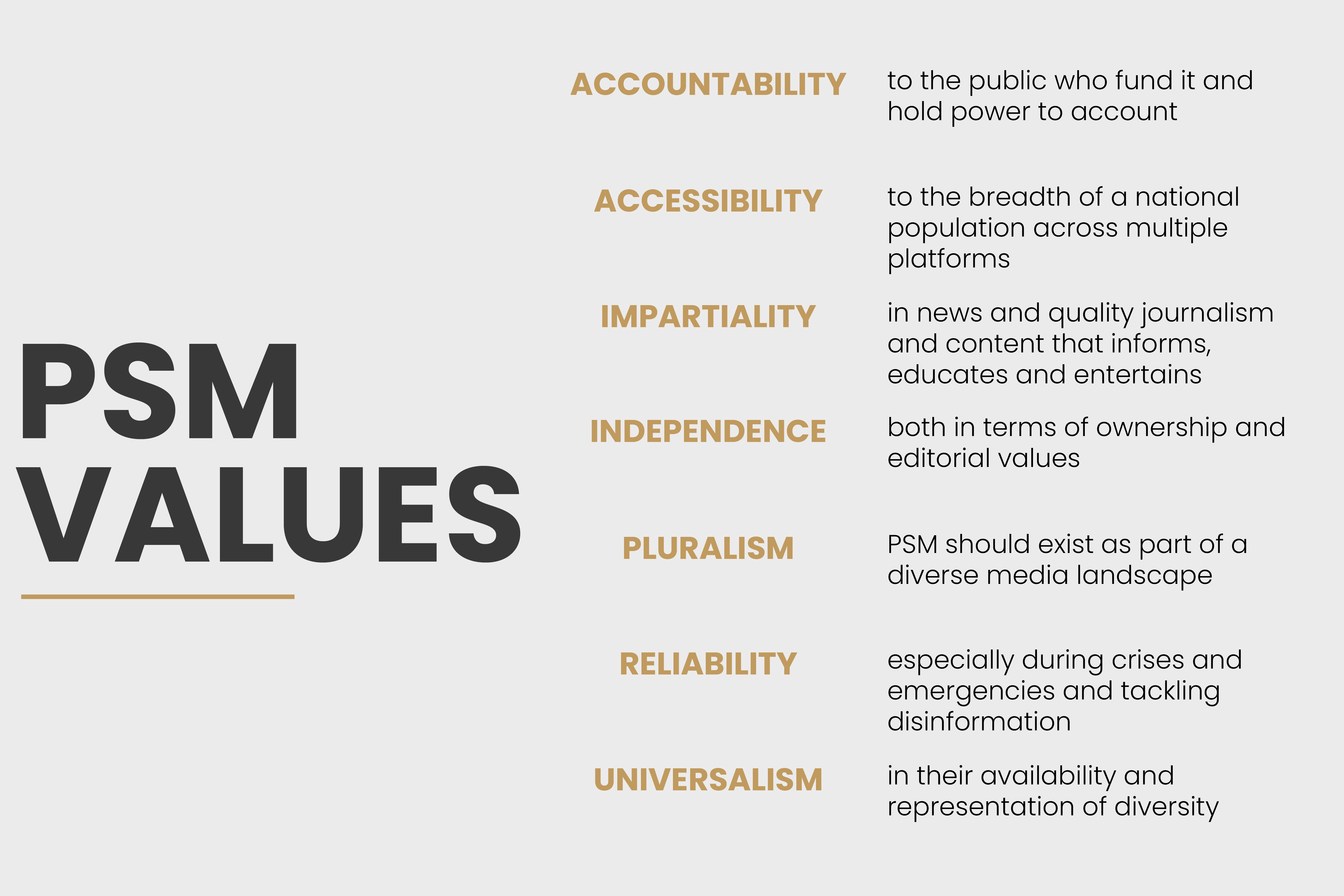PMA SECRETARIAT
Understanding public service media
26th March 2023
As debates on the future of public service media intensify, it’s essential for us all to reflect on their core values and fundamental role in democratic society.
With a number of heated debates taking place globally regarding the role of public service media, it is important for the public, politicians and commentators alike to step back and reflect on the core values of public media, and how they underpin informed societies and healthy democracies.
While these values are idealistic, and partly dependent on local contexts and challenges, they demonstrate the importance of public service media (PSM) within a plural media landscape, especially as a trusted source of education, entertainment and information in a time of polarised debate.
Ultimately, PSM must be independent from undue commercial and political interference. Unlike many private and state rivals, PSM are obliged to be representative of and accessible to diverse communities, to be impartial, and to provide a forum for debate and dialogue across a nation. Combined with a source of public funding, these principles help to ensure that PSM are accountable to the public first and foremost.
The very notion of PSM and its values are inherently idealistic. They are difficult to live up to. From Switzerland to the UK and South Africa, PSM organisations face significant challenges, many of them shared, such as pressures on funding and prominence in the digital age. Some of them are more specific, such as state capture or rows over the principles of impartiality – an inherently nuanced and often misunderstood concept, as we explain in our PSM Glossary.
When these principles work, they earn trust for PSM among the public. This is repeatedly seen in reports such as the annual Reuters Institute Digital News Report, and at times of crisis when audiences turn to public media for accurate and reliable news and information. The presence of independently regulated PSM also reflects a healthier environment for media freedom.
Yet, PSM are organisations where public trust is hard earned but easily lost. They are often confused with state media and accused of toeing a particular party line, while simultaneously being pressured by the very governments they are accused of being aligned to. It is often too easy to make impartial organisations the subject of political campaigns or used as so called “political footballs”, and many PSM need reform to better insulate themselves against interference and ensure they can effectively hold power to account without fear or favour.
Listen toour podcast
Uncovering and exploring the biggest
issues facing public media
Regardless of the situation, the questions the Public Media Alliance (PMA) often ask are: What would our societies be like without well-funded and independent PSM? How effective would our democracies be? And what more can be done to better ensure that PSM can offer value to, and are trusted by, the public?
The content gaps left by diminished PSM and their obligations to diverse audiences would not be filled by commercial competitors. PMA emphasised this in a recent submission against the privatisation of Channel 4 in the UK while a 2020/2021 deprivation study on behalf of the BBC demonstrated that doubtful audiences recognised the importance of PSM when access to the BBC was removed.
The vast majority of commercial operators and streaming services do not have a public service remit; they would not provide lifeline services in an emergency, they would not provide hours of local radio content, they would not invest in productions for the full spectrum of society. PSM provide this and more because the core driver of what they are is based on principles of public service.
Find out more about public service media: PSM Glossary
PSM contribute hugely to the social, cultural and political life of a nation, and therefore evoke passionate feelings. Decisions made by PSM inevitably become deeply felt and widely discussed. PSM – working on behalf of, and accountable to, the public – must listen to these arguments. But what should not be disputed, across the political spectrum, is the fundamental purpose and value of independent public service media.
In such fractious times, without better understanding and nuance of what PSM fundamentally is, should, and can be, we fear it will be too late before many realise what has been lost.
PMA Secretariat
Related Posts
21st March 2023
Sweden: Public service investigation directives unveiled
The investigation will focus on…
7th March 2023
US: Concern over political interference at West Virginia Public Broadcasting
Years-long political pressures on West…




